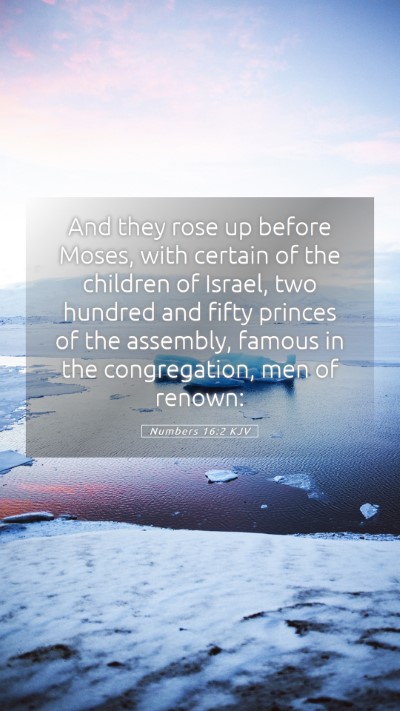Understanding Numbers 16:2
Numbers 16:2 states, "And they rose up before Moses with certain of the children of Israel, two hundred and fifty princes of the assembly, famous in the congregation, men of renown." This verse introduces a significant rebellion against Moses' leadership, highlighting key themes of authority, division, and the consequences of dissent within the Israelite community.
This passage is crucial for understanding the larger narrative in the Book of Numbers, as it sets the stage for Korah's rebellion, which represents a challenge to divinely appointed leadership. Various public domain commentaries provide insightful analyses to help us grasp the meanings and implications of this verse:
-
Matthew Henry's Commentary:
Henry emphasizes the seriousness of Korah's rebellion, noting that the leaders who opposed Moses were not ordinary men but rather were "princes of the assembly" and renowned figures. Their status makes their rebellion all the more poignant, reflecting how even those who may have a significant position can fall into pride and challenge God's order. This highlights the peril of ambition and influence when it leads one away from obedience to God's appointed leaders.
-
Albert Barnes' Notes:
Barnes elaborates on the background of the rebellion. He points out that Korah, along with Dathan and Abiram, recognized a perceived unfairness in Moses and Aaron's leadership, challenging their authority. This interpretation invites readers to reflect on the human tendency to resist established authority, especially when it is seen as unjust. Barnes encourages believers to consider the importance of maintaining unity and respecting divinely instituted leadership even in challenging circumstances.
-
Adam Clarke's Commentary:
Clarke presents a detailed discussion on the characters involved in this verse, focusing on Korah’s lineage and the implications of his actions. He explains that the rebellion occurred amidst the frustrations faced by the Israelites during their wilderness journey. Clarke urges readers to understand that the conflict stemmed from dissatisfaction and a lack of faith in God's plan, representing broader themes of rebellion against God’s sovereign choice and authority in our lives.
Significance in Biblical Context
The significance of Numbers 16:2 extends beyond a mere narrative. It serves as a cautionary tale about the dangers of pride and division. Throughout Scripture, disobedience and rebellion against God's chosen leaders often lead to severe consequences. The uprising initiated by Korah did not only signify a challenge to Moses but also brought about divine judgment, with severe implications for both the rebels and the greater community.
Cross References
- Korah's rebellion: Numbers 16:1-35
- Divine authority and leadership: Exodus 18:21
- Pride leading to downfall: Proverbs 16:18
Applications for Today
Understanding Numbers 16:2 and its implications can serve as a profound tool for Bible study groups and individuals embarking on online Bible study.
-
Humility in Leadership:
This text advises current and aspiring leaders to remain humble and open to God's guidance rather than allowing personal ambition to cloud judgment. It underscores that while leadership is a gift, it must be approached with reverence and awareness of spiritual responsibilities.
-
The Impact of Influence:
The men who rose up against Moses were men of renown. This serves as a reminder of how influential figures can sway groups, reminding believers to critically analyze their influences and maintain focus on godly principles.
-
Unity in the Body:
The rebellion highlights how division can hinder a community's mission. Church leaders and members alike must strive for unity and address grievances through prayer and dialogue rather than rebellion or contention.
Conclusion
Numbers 16:2 encapsulates a critical moment of tension between authority and rebellion, reminding readers of the consequences that can follow when ambition and dissatisfaction take precedence over divine order. Whether through direct reading or Bible study tools, engaging with this verse allows for a deeper understanding of Scriptural themes like leadership, accountability, and community unity in faith.


